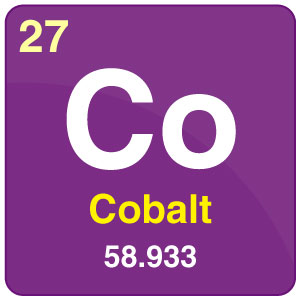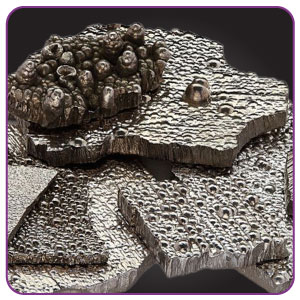Cobalt

| Symbol | Co |
| Atomic Number | 27 |
| Atomic Mass | 58.933 |
| Discovered by | Cobalt was discovered by Georg Brandt |

Table of Contents
Chemical Properties Of Cobalt
| Group | 9 | Melting point | 1495°C, 2723°F, 1768 K |
| Period | 4 | Boiling point | 2927°C, 5301°F, 3200 K |
| Block | d | Density (g cm−3) | 8.86 |
| Atomic number | 27 | Relative atomic mass | 58.933 |
| State at 20°C | Solid | Key isotopes | 59Co |
| Electron configuration | [Ar] 3d74s2 | CAS number | 7440-48-4 |
| ChemSpider ID | 94547 | ChemSpider is a free chemical structure database | |
What is Cobalt?
-
-
-
- The element Cobalt belongs to the group VIII of the periodic table. It is similar to iron and nickel in its physical properties. Cobalt is found in plants and animals, air, water, soil, rocks. It may also enter into another environment through wind-blown dust or by rainwater washing down cobalt containing soil and rock.
-
-
Uses Of Cobalt
-
-
-
- Cobalt is used in many alloys & super alloys to make parts in aircraft engines, gas turbines, high-speed steels, corrosion-resistant alloys, and cemented carbides.
- It is used in magnets and magnetic recording media.
- It is also used as a catalyst for the petroleum and chemical industries.
- Used as drying agents for paints and inks.
- It is blue is majorly used by artists and is used by craft workers in porcelain, stained-glass pottery, enamel jeweller, and tiles.
- The radioactive isotope, cobalt-60, is used in medical treatment and also to irradiate food. It is used in order to preserve the food and protect the consumer.
-
-
Properties Of Cobalt
-
-
-
- It is a hard ferromagnetic, silver-white, lustrous, brittle element.
- It is stable in air and does not react with water.
- Like other metals, it can also be magnetized.
- With dilute acids, it reacts slowly.
- The metal melts at 1495 °C and boils at 2927 °C
-
-

Comments